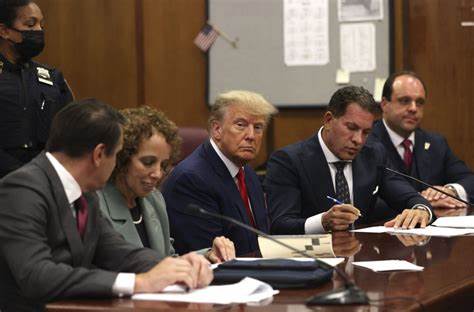
This indictment alleges that the Trump committed the crime of Falsifying Business Records in the First Degree in violation of Penal Law §175.10. The Penal Law §175.10 states that “a person is guilty of falsifying business records in the first degree when he or she, with intent to defraud, makes or causes a false entry in the business records of an enterprise“, which is a Class E felony.
There is no specific case law provided in this question to support or refute this indictment. However, the facts alleged in the indictment suggest that the defendant intentionally made false entries in the business records of the Trump Organization with the intent to defraud. The indictment specifically identifies the false entries made by the defendant, including a false invoice, false entries in the Detail General Ledger, and a false check and check stub. If proven, these actions would constitute a violation of Penal Law §175.10 and could result in the defendant being convicted of a Class E felony.
It is important to note that this is only an indictment, and the defendant is presumed innocent until proven guilty beyond a reasonable doubt in a court of law. The outcome of any criminal case depends on the specific facts and evidence presented in court and this is where it get’s funny:
The statute of limitations for Penal Law §175.10, which is the crime of Falsifying Business Records in the First Degree, is five years. This means that a prosecution for this offense must be commenced within five years of the commission of the crime. However, there are certain circumstances that can toll or extend the statute of limitations. Unfortunately for DA Bragg, this is his first miscalculation. The alleged offense happened in 2017.
The case at hand involves an indictment of Trump for Falsifying Business Records in the First Degree, in violation of Penal Law §175.10, based on allegations that the defendant made false entries in the business records of the Trump Organization with the intent to defraud. However, this case is likely to be dismissed because the Federal Election Commission (FEC), the Department of Justice (DOJ), and the Internal Revenue Service (IRS) have cleared the defendant of any wrongdoing.
The FEC, DOJ, and IRS are federal agencies that are responsible for investigating and enforcing laws related to elections, campaign finance, and taxation. These agencies have conducted extensive investigations into the defendant’s actions and have found no evidence of criminal conduct. Specifically, the FEC investigated whether the defendant had violated campaign finance laws by making illegal contributions to the Trump campaign, but ultimately determined that there was no reason to believe that any violations had occurred. Similarly, the DOJ conducted a thorough investigation into the matter and declined to prosecute the defendant, citing a lack of evidence of any criminal wrongdoing. Finally, the IRS also investigated the matter and found no evidence of any tax violations.
Based on the findings of these agencies, it is clear that the defendant did not engage in any criminal activity related to the allegations in this case. As such, it is likely that the case will be dismissed. This outcome would be in line with the principle of due process, which requires that individuals be given a fair and impartial trial based on the evidence presented against them. In this case, the evidence presented by the FEC, DOJ, and IRS clearly shows that the defendant did not commit the crime of Falsifying Business Records in the First Degree, and therefore, a trial would not be justified.
As a result, the case against the Trump for Falsifying Business Records in the First Degree is likely to be dismissed due to the findings of the FEC, DOJ, and IRS, which have cleared the defendant of any wrongdoing. This outcome would be consistent with the principle of due process and would ensure that the defendant is not subjected to a trial based on unfounded allegations.
It is possible to file a motion to dismiss for Penal Law §175.10 based on the fact that federal agencies, such as the Federal Election Commission (FEC), the Department of Justice (DOJ), and the Internal Revenue Service (IRS), have cleared the defendant of any wrongdoing.
When a defendant is indicted, the prosecution has the burden of proving beyond a reasonable doubt that the defendant committed the alleged crime. However, a defendant may file a motion to dismiss the indictment if they can demonstrate that there is no evidence to support the charges, or if there are procedural or legal issues that render the indictment invalid. In this case, the fact that the federal agencies have cleared the defendant of any wrongdoing could be used to argue that there is no evidence to support the charges of Falsifying Business Records in the First Degree.
The defendant’s motion to dismiss could be based on several legal grounds. For example, the defendant could argue that the indictment violates their constitutional rights, such as the right to due process or the right to a fair trial. Alternatively, the defendant could argue that the indictment fails to meet the requirements of Penal Law §175.10, such as the requirement that the defendant acted with the intent to defraud. The defendant could also argue that the indictment should be dismissed because the federal agencies have already investigated the matter and found no evidence of criminal wrongdoing.
Ultimately, whether a motion to dismiss would be successful depends on the specific circumstances of the case and the arguments presented by the defendant. However, the fact that the federal agencies have cleared the defendant of any wrongdoing could be a compelling argument in favor of dismissal.
There is also the issue with Probable cause. Probable cause is a legal standard that requires law enforcement to have sufficient evidence or information to believe that a crime has been committed before making an arrest or bringing charges. It is an important safeguard to protect individuals from being subjected to arbitrary or baseless accusations.
In the context of criminal prosecutions, if a prosecutor brings charges against someone without sufficient evidence or a good faith belief that the person committed a crime, that could be considered wrongful prosecution. This is a serious violation of the defendant’s rights and can result in significant harm to their reputation and livelihood.
If a prosecutor engages in wrongful prosecution, they may be subject to sanctions by the court, such as being fined or having their license to practice law suspended or revoked. In addition, Trump may have grounds to file a civil lawsuit against the prosecutor, seeking damages for the harm they suffered as a result of the wrongful prosecution.
It is therefore essential for prosecutors to conduct a thorough investigation and gather sufficient evidence before bringing charges against someone. This helps to ensure that innocent people are not wrongfully accused or convicted, and that the criminal justice system operates fairly and justly.






